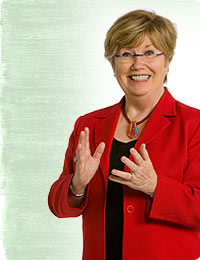A reputation can be ruined by a single mistake
Crisis communication is the key component in dealing with reputation ruining mistakes. As the topic of Ball State alumna Myra Borshoff Cook’s presentation Sept. 28, she discussed crisis communication and provided insight on how she believes crises should be best handled.
Crises can come in any form, she said. Whether it’s a natural disaster, an employee incident or something else, a company and its public relations firm need to be ready to handle it with or without advanced preparation.
Cook said crisis communication is her favorite part of public relations work because of the unique aspects to it and the short-term time period the firm and company must work under.
“It’s the most challenging work,” she said. “It makes me work hard.”
Public relations are important in a crisis in order to correct misinformation, avoid confusion, present the story and keep the story to one day, Cook said. “You don’t want it to drag on and on and on.”
Cook said the multitude of media outlets, including citizen journalists and social media, make it imperative for a company to be in front and open with their side of the story.
Who gives the message is important as well, she said. If a CEO or president is flubbing lines or saying the wrong thing, it will put a poor image on an already tarnished company.
“When you turn on Jon Stewart and you see your company, that’s not good,” Cook said.
One key component of crisis communication is to apologize when a crisis occurs. She said it shows that the company has compassion, which outweighs any negatives from being apologetic.
Lawyers may disagree, but they have to be removed from the process at times.
“When you really have a problem and you really need to restore your reputation, you have to get the lawyers out of the way,” Cook said.
Cook pointed to Johnson and Johnson as a model company in handling crises, specifically the Tylenol poisonings of 1982.
On the other side, she talked about recent crises and subsequent communication disasters at BP and Toyota. She went through the mistakes of each company, including BP’s decision to try and place the blame on someone else. Cook said the result of that is often losing an ally rather than fixing a problem.
Many times, employees at a company will be asked about an incident, so they need to be informed in order to be able to answer questions and be on message.
“Employees are expected to know what’s going on,” Cook said.
She told public relations students they should continue to work on strengthening their writing, as that will be a key factor in whether they get a job after graduation. Additionally, the fact that new graduates have experiences with social media and technology will make them desirable hires, Cook said.
Students should also branch out from communication studies and take classes in business or another discipline, Cook advised.
“Be balanced in your education,” she said.
At the beginning of her speech, Cook talked about the five things she learned to help her be a strong public relations practitioner: attitude, bouncing back from problems, listening over talking, the importance of yes and no and having a sense of humor.
“If you don’t have a sense of humor, go to law school,” she quipped.
In introducing Cook, Willis relayed one of those lessons he had learned from her.
“Attitude rules,” he said. “With positive attitude, you can learn from everyday experience.”
Cook mentioned a few possible crises people should keep an eye on, both as stories and to monitor how the response is handled. She pointed to the salmonella outbreak in eggs and the film “Waiting for Superman,” which deals with public education in America. Cook advised that students who are interested in crisis communication should keep an eye on these crises as they develop so they can learn.
Cook founded her public relations company Borshoff in 1984, which Department of Journalism chairman Jim Willis called one of the premier public relations firms. Borshoff has worked with a number of high-profile Indiana clients, including Indianapolis Power and Light, Wishard Health Services and the Colts.




